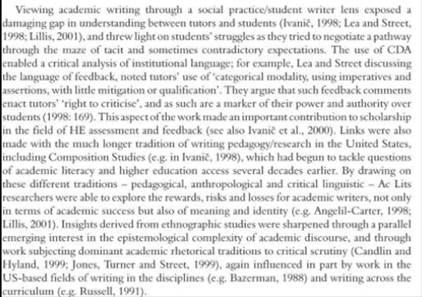Taking a closer look at the role of social theory in English for Academic Purposes – Michelle Evans
Taking a closer look at the role of social theory in English for Academic Purposes – Michelle Evans – M.J.Evans2@leeds.ac.uk
This project began with an observation. While reading research articles and other texts related to various aspects of EAP, I noticed a recurring feature. The observation reoccurred in the literature-reviewing stages of a text when we often discuss concepts and refer to any epistemological orientation and informing theories. Probably due to limited space, the references to underpinning social or sociological theories tended to be a courteous nod to a well-known contributor or seminal text. Here is an example from an edited volume.

In the quote above, Lillis and Tuck (2016) helpfully identify how the Academic Literacies approach has been informed by: 1) Critical Discourse Analysis with its dependency on power relations, ideology and hierarchy 2) Composition Studies and Writing Across the Curriculum, which were informed by the Rhetorical tradition and 3) Ethnography, which is informed by social anthropology and is (arguably) interpretivist in nature. Each of these have their own legacy, their own ontological and epistemological commitments. They are underpinned by some substantial social and sociological theories that are not fully acknowledged here. The way in which the world and the role of language is understood through a functionalist, consensus view, for example, may well lead to important differences to approaches based on perspectives centred on the coercive role of social structures when groups and individuals are competing for legitimisation or autonomy in a given context.
This type of light-touch acknowledgement to theory and related premises is probably fine and unproblematic for the purposes of most texts, and readers can still take what information they need but the question was, and still is, what if we never really ‘dig-down’ into these more substantive social fundamentals? Given the eclectic nature of theory and pedagogies in EAP, is there a risk that we participate in a type of theoretical reductionism that becomes evident in our pedagogies? Perhaps not. Based on these types of questions (and others), the task of reviewing EAP theories that have significantly informed our thinking and practice, as well as discussing those that might have more to offer, sounded like a good idea. In response, a co-edited volume with Dr Alex Ding, called ‘Social Theory for English for Academic Purposes: Foundations and Perspectives’ was approved within the Bloomsbury series, ‘New Perspectives for English for Academic Purposes.’ As well as co-editing, I am writing a chapter on Social Theory and Genre in this volume. In this chapter, I will be reviewing genre traditions within EAP thinking and practice with a focus on the role of some substantive social and sociological theories within these.
